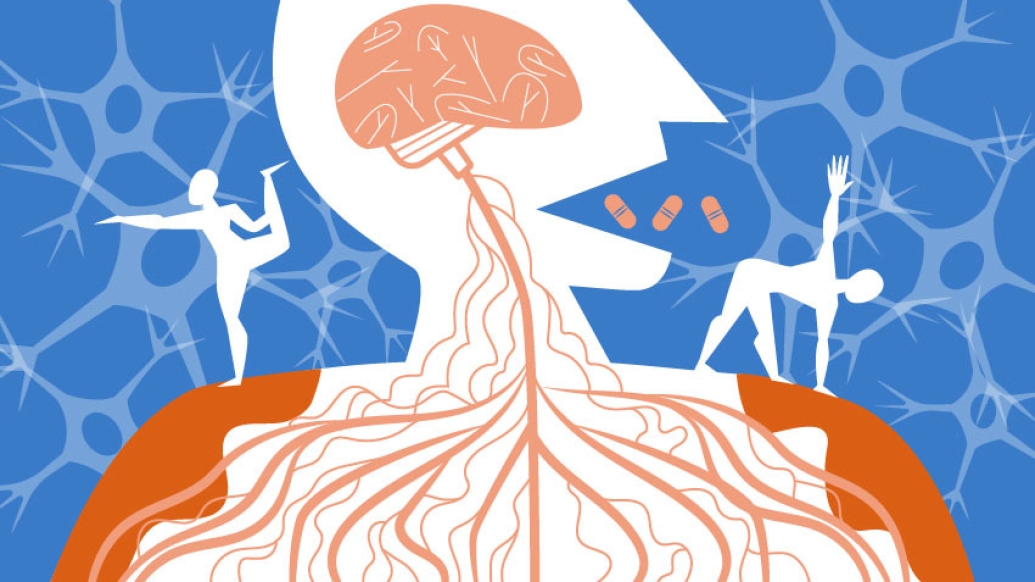A neurologist shares alternative treatments for chronic pain and the importance of steering clear of opioids.
12:15 PM
Author |

With established evidence supporting the relationship between opioid usage and addiction, it's no surprise that physicians like University of Michigan Health neurologist Brian Callaghan, M.D., M.S., are committed to researching alternative therapies for the estimated 20 million Americans suffering from chronic pain, also known as neuropathic pain.
Callaghan is lead facilitator in an American Academy of Neurology clinical guideline on oral and topical treatments for painful diabetic neuropathy, published in January 2022.
The guideline recommends physicians prescribe these treatments instead of highly addictive opioids, which block receptors in the brain responsible for pain but also increase feelings of euphoria, resulting in abuse for some patients.
Like nicotine, opioids work on certain receptors in the brain, says Callaghan.
SEE ALSO: New guideline urges ditching opioids for painful diabetic neuropathy
"Addiction depends on the brain chemistry. Everyone reacts to these medications differently, so there's no way to know who will become addicted."
What causes neuropathic pain?
Patients with neuropathic describe what they experience as burning, electric and/or stabbing pain typically in the hands, legs and feet, says Callaghan.
Although diabetes is the number one cause of neuropathic pain, followed by idiopathic (unknown) reasons, other causes include:
-
Alcoholism
-
HIV/AIDS
-
Nutritional deficiencies
-
Chemotherapy
-
Genetics
Treating neuropathy
The goals of treatment for neuropathy are to provide relief from pain, help maintain functionality and improve quality of life. To achieve these goals, the guideline recommends patients be treated with one of three alternatives to opioids:
1. Oral medications:
-
Gabapentinoids
-
Serotonin and norepinephrine reuptake inhibitors (SNRIs)
-
Tricyclic antidepressants (TCAs)
-
Sodium channel blockers
2. Topical treatments such as capsaicin
3. Non-pharmacologic therapies such as exercise, mindfulness and cognitive behavioral therapy
"These three treatment categories are not addictive," said Callaghan, who noted another aspect of the new guideline is to help patients avoid the addictive nature of opioids altogether.
"While we have evidence that opioids work in the short term for acute surgical pain, we are learning we should avoid them if we can, and reduce the amount given to a patient if possible. If we give patients less, they are less likely to become addicted.
We've made a lot of inroads in reducing opioid usage – but it's still a big issue.Brian Callaghan, M.D., M.S.
"But we don't have evidence opioids work in the long term for neuropathic pain. In contrast, we do know about the harm they cause, particularly when used for chronic pain conditions, so we really urge people not to use opioids."
This also includes tramadol, which works in the brain to change how your body feels and responds to pain, says Callaghan.
"Tramadol is a type of opioid and SNRI that some clinicians think is a safe alternative to opioids, but it has the same addictive issues."
The future of medication
Callaghan admits there is still a long way to go in phasing out opioids.
"We've made a lot of inroads in reducing opioid usage – but it's still a big issue. Our current pain medications are good, but we really don't have any great options," said Callaghan, who noted that many of the recommended therapies have been shown to reduce pain while not completely eliminating it.
"Much of our research energy is focused on finding the next treatment that can help reduce pain, has fewer side effects and is not as addictive."
But while medication is helpful for most individuals suffering from neuropathic pain, Callaghan says there are other ways to minimize symptoms.
"Pain is a very complicated thing, not just due to the underlying injury but also related to other factors, such as sleep quality and mood issues."
For this reason, he's told his patients: "Make sure all the other aspects of your life are doing as well as possible in dealing with pain, including depression, anxiety and sleep. Pain causes problems in those areas and vice versa."

Explore a variety of health care news & stories by visiting the Health Lab home page for more articles.

Department of Communication at Michigan Medicine
Want top health & research news weekly? Sign up for Health Lab’s newsletters today!





